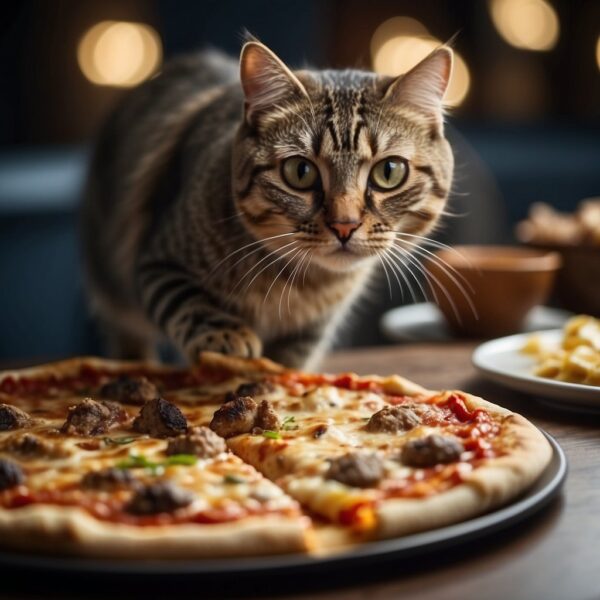
Cats and Pizza: Risks and Safe Feeding Practices
Cats may often be curious about human foods, and pizza, being a common favorite in many households, is no exception. Cat parents might wonder if cats can eat pizza. Is sharing a slice with their cats safe. However, pizza is not suitable for cats. The ingredients commonly found in pizza, such as garlic, onions, cheese, and certain processed meats, are not cat-friendly and can pose significant health risks. These ingredients can lead to complications ranging from digestive upset to more severe conditions like sodium poisoning and anemia.
Cats are obligate carnivores, requiring a diet high in protein from animal sources. Their nutritional needs are distinct and cannot be met by human foods. With the wide variety of toppings and seasonings present in pizzas, there is a high probability of cats ingesting something potentially toxic. Moreover, the high-fat and sodium content in pizza can lead to obesity and other health issues over time, reinforcing the need for caution when considering what foods to share with a pet cat.
Key Takeaways
- Pizza is not a suitable food for cats due to its potential health risks.
- Ingredients in pizza can cause digestive upset and serious medical conditions in cats.
- Cats have specific dietary needs that are not met by human food like pizza.
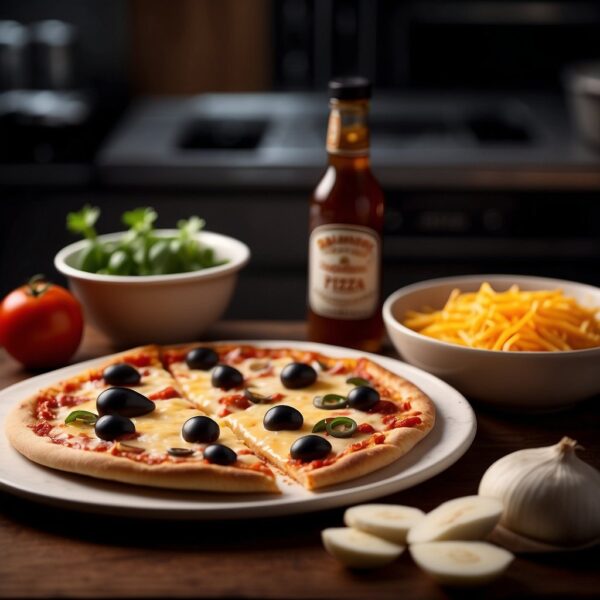
Potential Health Risks in Pizza Ingredients
Pizza incorporates a range of ingredients that can pose health risks to cats, including toxic foods, digestive irritants, and ingredients that disrupt nutritional balance.
Toxic Ingredients for Cats
Certain common pizza ingredients are toxic to cats. Onions and garlic, for instance, can cause anemia and red blood cell damage, leading to symptoms like lethargy and pale gums. Additionally, the solanine in tomato sauce can lead to solanine poisoning if consumed in large quantities.
Harmful Effects of Dairy Products
Cats often are lactose intolerant and cannot properly digest dairy products like cheese, which can result in gastrointestinal distress such as bloating, gas, diarrhea, and vomiting.
Meat Toppings and Fat Content
Meat toppings like pepperoni, bacon, and sausage contain a high-fat content and are often processed. These can contribute to obesity in cats and may cause pancreatitis, a serious health condition.
Problems with Pizza Dough and Crust
Raw dough can ferment in a cat’s stomach, causing bloating and the production of alcohol, which can lead to intoxication. Cooked pizza crust lacks nutritional value for cats and may contribute to obesity.
Sodium and Additives
Pizza is high in salt and other additives that can be harmful to cats. Excessive sodium intake can lead to electrolyte imbalances and may contribute to increased blood pressure and other health issues.
Allergic Reactions and Food Intolerance
Just like humans, cats can have allergies or food intolerance. Ingredients in pizza may trigger allergic reactions or cause food intolerance, leading to upset stomach and discomfort.
Risk of Gastrointestinal Distress
High-fat and dairy-rich components of pizza can cause gastrointestinal distress in cats, including diarrhea, vomiting, and upset stomach.
Concerns with Nutritional Balance
Pizza does not meet the nutritional requirements of cats, who are obligate carnivores. Feeding them pizza can disrupt their nutritional balance and lead to deficiencies.
Risk of Anemia and Red Blood Cell Damage
Ingredients like onions and garlic contain compounds that can cause oxidative damage to a cat’s red blood cells, potentially leading to anemia.
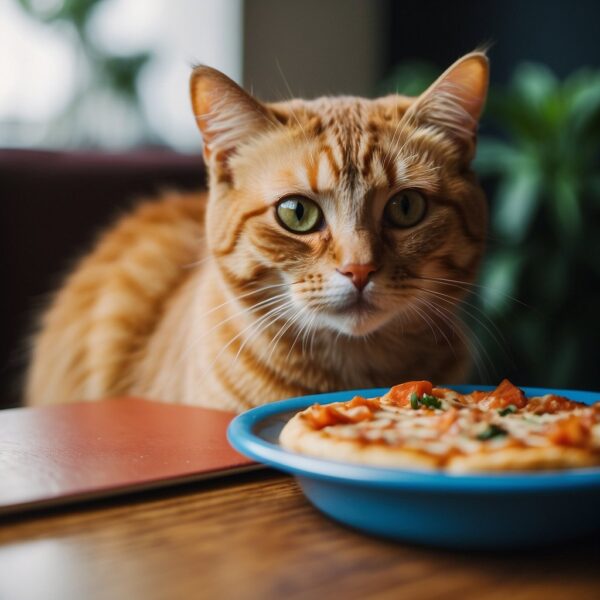
Safer Alternatives to Pizza for Cats
While cats may show interest in pizza, it is not a suitable food for them due to the risk of weight gain and potential digestive issues from unhealthy toppings and ingredients. This section explores cat-friendly snack options that prioritize their health and safety.
Healthy Snack Options
Cats can safely enjoy unseasoned lean meats like chicken or turkey. These should be cooked thoroughly, avoiding harmful uncooked meats. Cat parents can provide these as treats in moderation to prevent unnecessary weight gain.
Suitable Cheese Types for Lactose-Tolerant Cats
While many cats are lactose intolerant, those that tolerate dairy may enjoy small amounts of cheese. Opt for varieties low in lactose, like hard cheeses, and serve in moderation to avoid digestive issues.
Appropriate Fruits and Vegetables
Certain fruits and vegetables can be healthy snacks for cats. Small portions of pineapple or mushrooms are safe when served plain and in moderation. Always remove inedible parts and opt for fresh or baked versions without added oils and seasonings.
Hydration and Water Intake
Water is vital for cats, even more so than specific food snacks. Owners should ensure constant access to fresh water, encouraging their pets to stay hydrated, which aids in overall health and digestion.
Homemade Cat-Safe Pizza Options
For those wanting to create a pizza-like experience for their pets, they can use cat-safe ingredients like plain flour, olive oil, and safe toppings such as baked chicken. These homemade cat treats should be unseasoned and free from harmful human food additives.
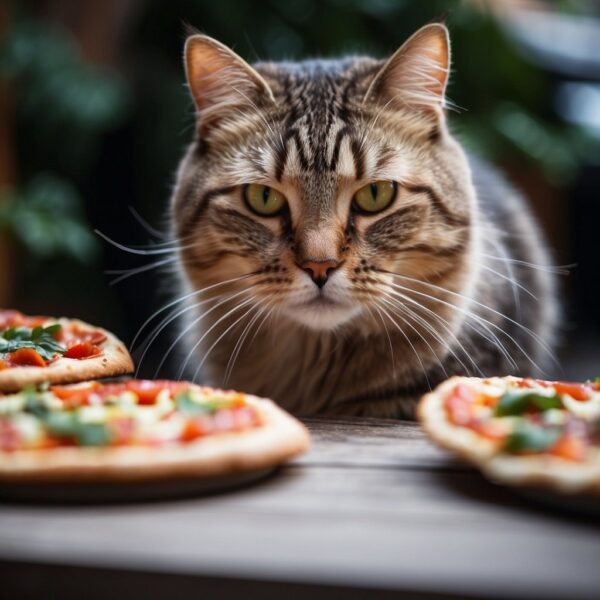
Conclusion is Cats Should not eat pizza
Cats have nutritional needs that are distinct from humans and pizza does not align with what is beneficial to their health. Pizza poses several risks to cats due to its high fat content, sodium, garlic, onion, and cheese. The consumption of these ingredients can contribute to health problems such as obesity and digestive issues.
Ingredients in Pizza Harmful to Cats:
- Garlic and Onions: Cause gastrointestinal distress and potential anemia.
- Cheese: Lactose can be difficult for cats to digest.
- High Salt and Fat: Can lead to obesity and other related health issues.
Feeding cats pizza, be it the crust, toppings, or any part of it, should be avoided. They require a diet tailored to their carnivorous nature, which is rich in proteins and taurine, an essential amino acid found in meat.
If a cat consumes pizza by accident, it is important they be monitored for any signs of gastrointestinal upset or other distress. Seeking veterinary advice is recommended in the case of any abnormal behavior or symptoms after ingestion.
It is crucial for cat parents to understand that while human foods like pizza may be tempting to give to pets, it is not advisable. For the well-being and longevity of a cat, sticking to a properly formulated diet specifically designed for them is the wisest and safest approach.
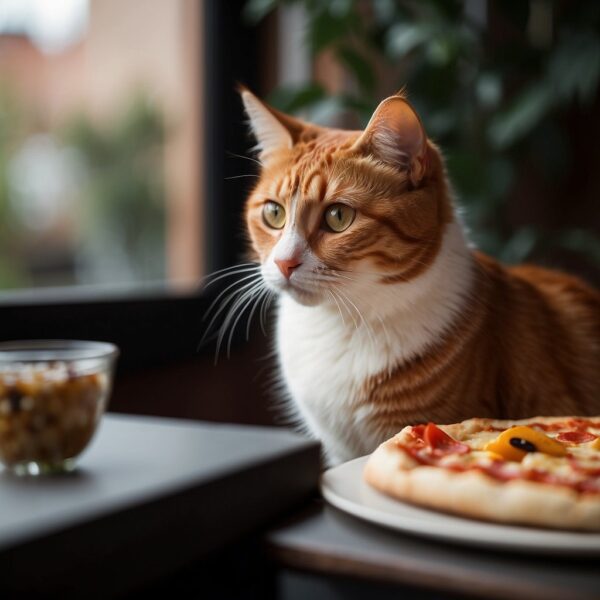
Frequently Asked Questions
In this section, we address common concerns about the safety and health implications of feeding pizza to cats. These questions are essential for cat owners to understand the potential risks and proper care in such situations.
Is pizza crust safe for cats to eat?
Pizza crust is not toxic to cats, but it offers no nutritional value and can be hard to digest. Feeding cats plain bread-like foods, such as pizza crust, is not recommended.
What are the effects of pizza cheese on a cat’s health?
Cheese from pizza can lead to gastrointestinal upset in cats. Since many cats are lactose intolerant, the lactose in cheese can cause symptoms such as stomach pain and diarrhea.
Can pizza sauce cause harm to cats?
Pizza sauce often contains garlic and onions which are toxic to cats. Even small amounts of these ingredients can cause health complications, so pizza sauce should be avoided.
Are pizza rolls a safe snack for cats to eat?
Pizza rolls are not a safe snack for cats. They contain dough, cheese, and sauce, all of which pose the same risks as traditional pizza when it comes to a cat’s health.
Is it dangerous for cats to eat pepperoni pizza?
Pepperoni pizza is particularly harmful to cats due to the high fat and sodium content in pepperoni, which can lead to pancreatitis and other health issues. Additionally, the spices are bad for a cat’s stomach.
What should I do if my cat accidentally consumes my pizza?
If a cat consumes pizza, especially with dangerous toppings or sauces, observe them closely for signs of distress and contact a vet immediately if any symptoms arise.